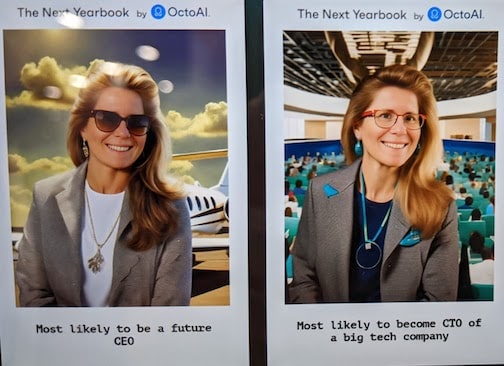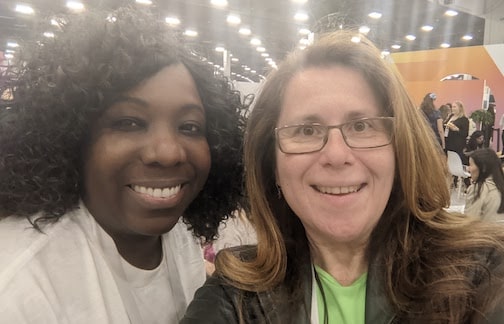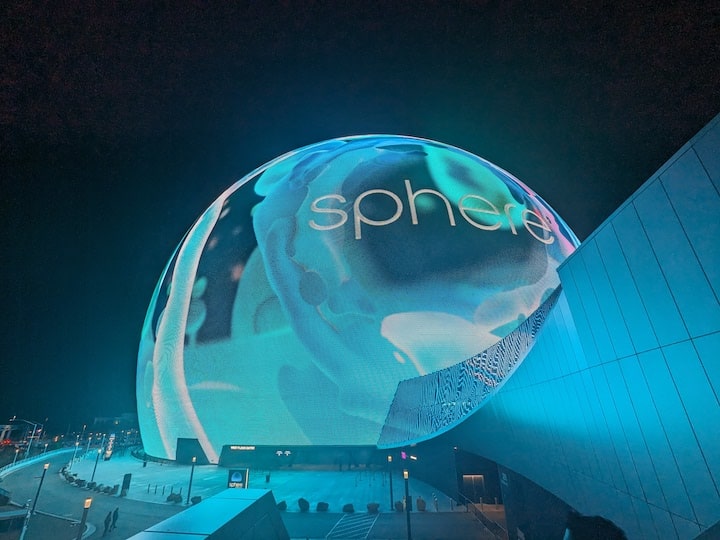What’s common between GCP Next and the Sphere?¶
My impressions and insights based on attending the GCP Next event in Las Vegas on April 9-11, 2024.

Summary¶
Thanks to our Google Cloud Platform partner, I was able to attend the GCP Next conference in Las Vegas this year. This was my 2nd GCP Next; the first was in 2018 in San Francisco, when I was actually on the inside as part of the Google Cloud team, leading content for the DevOps tooling track!
The schedule and setting made it very clear that Google’s top goal for GCP Next this year was to promote AI, followed by security. There was also a prominent display of data and security platforms, but AI dominated even those vendor displays and presentations.
I made a conscious attempt to connect with attendees on the topic of Developer Experience and Developer Productivity. With the growth of AI, the need for more efficient developer pipelines driving code to production is still relevant, and resonates with CTOs and other technical leaders I’ve spoken with. Multiple large enterprise attendees alluded to cost efficiency and optimizing cloud spend as a key priority, which impacts both AI initiatives and platform engineering priorities.
Insights¶
- Top areas of focus are 1) AI, 2) security, 3) cost optimization.
- Multi-cloud strategy is a reality for enterprise.
- Google is very much embracing the “multi-cloud” message, as it allows them to compete with other providers. It can help Google get into deals it may not otherwise be able to and to offer a highly competitive pricing, which many enterprises enjoy.
- Most enterprise executives I’ve spoken with use multiple clouds.
- Many vendors I’ve spoken with deploy solutions for GCP, AWS and Azure.
- Partnership is a good way to accelerate revenue but takes a lot of work.
- Google Independent Software Vendor (ISV) partnerships are an important part of GCP’s growth strategy.
- Selling via Marketplace (not necessarily deploying) is a priority.
- Increasing the partnership tier is tied to the spend and value you bring to Google with your product.
- Tips from Partnership execs from Databricks, Fivetran, Hashicorp, and Intel is that setting revenue goals for the partnership opportunities and working with ISV partners to educate GCP sales can help land larger/more deals.
- Cloud migrations are accelerated by partnerships with large consultancies like Deloitte, Cognizant, Sada, DoIT. (They had a very significant presence at GCP Next.)
- Google’s AI is accelerating quickly, and is being deployed in its services (productivity apps, Gmail) as well as business applications and developer tooling.
- Lots of demos and sessions encouraging companies to use the Vertex AI Agent Builder, a no-code tool.
- Kubernetes continues to be a large focus for Google in getting more customers running Google Kubernetes Engine (GKE) at scale.
- Interesting talks from Unity and Anthropic, among others, on hitting cluster limits and coming up with alternative approaches to scale, while also focusing on cost optimization with tools like GKE Autopilot and Cost Analysis APIs.
- This left me wondering about the benefits of moving from VM based to kubernetes based approaches as we manage clusters of tens of thousands of machines and are scaling to 100,000 instances. Several follow up conversations with the attendees and GCP are in order.
Startup Lounge¶
Mantle - I reconnected with Dwayne Forde, co-founder & CTO of Mantle. Prior to that we were both on the advisory board of a private company. I missed his talk, so it was super great of Dwayne to come back to GCP Next when I messaged him that I wanted to catch up. Mantle is a seed stage company but has already made remarkable progress, as it’s taking on the mission to re-imagine capitalization table and fund management using its AI centric approach. As the company is utilizing Gemini, they are getting great visibility within GCP. Alignment of your tech needs/opportunities to the partner’s top tech products makes for an effective ISV partnership.

Octo.ai - production GenAI serving stack - founded in 2019, used this fun gimmick to demonstrate their product and add some AI pixie dust (literally) to the attendee profiles. Its AI thought that I might be a CEO one day, or a public tech company CTO, as seen in these generated photos. Both are not mutually exclusive in my opinion!
Swit - workplace collaboration tool - looks basic, but a good promise to pull various collaboration and project management threads into a single workflow. There may be other startups that do something similar; this one was just doing a demo.
Product Science - platform that analyzes the code and actual runtime data to pinpoint performance issues. Using AI to provide unique insights for data visualizations to help mobile developers to identify the problem right away.
The Inclusion Lounge done right¶
It’s easy to get me on a soap box about various inclusion programs which are exclusion driven. My feedback on these programs has been that our progress will be limited as long as we keep pulling only the people that are part of a specific underrepresented group together, without giving their colleagues from other groups an opportunity to learn and collaborate.
Diversity comes in many forms, and it is often overlooked that people from various cultural and socio-economic backgrounds, and even different personalities, may need various degrees of support to feel included in the organization beyond the scope of mainstream inclusion initiatives.
So, I was pleased to see Google’s Inclusion Lounge done right this year:
- It was open to everyone.
- The talks focused on variety of business and inclusion topics.
- The resources were impactful:
- 15 min coaching sessions
- Professional headshots
- Special events for those who still wanted to organize in groups, e.g., women’s lounge
I took advantage of several of these, had a few insightful conversations, noted below helpful resources, and even took this opportunity to replace my profile photo taken by my son 10 years ago!
Resources
- For Women in Non Eng Roles: 2 day virtual 'Cloud Digital Leader' training event June 6th and 7th, 2024. This is a great opportunity to sign up for women working for companies that are GCP Partners (we are)!

- Women Tech Makers: Peta Gay Clarke, my Google friend and Pace University Seidenberg CSIS advisory board peer, leads several community initiatives at Google, including Women Techmakers. They run a number of global events, including hackathons and meetups. I’ve volunteered with them in the past, good org to be a part of.
Expo Hall¶
These are not recommendations for purchasing, just a few interesting companies I learned about, among dozens of others, while being mostly influenced by my company’s current discussions and opportunities related to monitoring clusters at scale and scalable databases.
-
Chronosphere - compete with Honeycomb (new gen solution) as well as Grafana and other monitoring solutions. 5 year old company, created by former Uber engineers. Snap is a customer - claiming 90% reduction in pages in their case study How Snap Increased Observability Reliability And Improved Developer Experience.
-
ScyllaDB - commercial and Open Source NoSQL Database for Data-intensive Applications. Low latency, distributed db. Palo Alto Networks case study is interesting - especially given it’s for event data - using it instead of Kafka.
-
Wiz - it was impossible to miss Wiz, the enterprise security software company, because of their Diner booth and Elvis impersonations throughout the expo floor. This is a company that definitely knows how to do the Sizzle!
Andreessen Horowitz Happy Hour¶
Our a16z investors offered a good opportunity to meet technical leaders across industries at their happy hour, and to exchange notes and tips with partner managers at Hashicorp, Databricks and Fivetran - companies I highly regard and look up to for inspiration in creating significant value for developers. The main points are that cloud partnerships can be very effective in co-sell opportunities, take commitment and nurturing, and benefit from creating clear value proposition “battle cards” to train the cloud provider sales teams.
A surprising encounter was with the founding engineer and CTO of Gymshark, who announced a discount code for their merch, which I immediately texted to my daughter, an avid Gymshark fan! I’ve also passed on to her how they use JavaScript in their website development, hoping to inspire more interest in learning it by providing an example from one of her favorite companies (as we’re currently both struggling with debugging JavaScript for one of her classes)!
Afterparty with (literal) war stories¶
After the full day conference, and the a16z event, I felt like I needed more social interaction in my day, so went to check out the Kings of Leon concert GCP hosted for the attendees. On a walk to the Allegiant Stadium I met a partnership/solutions architect from Intel, and we exchanged war stories (literally) - he told me about escaping Kuwait post Iraqi invasion, and I shared my family stories from Ukraine. Spending 8 days without much food, providing for women and children in the same community, escaping via Jordan, living in tents, and finally moving to the US certainly puts perspective on various day to day technical and business challenges that he faces! He emphasized the importance of cloud partnerships, and also that Intel has its own partner program.
The Sphere¶
 Finally in the last evening of the conference I was able to do my much awaited 2 hour walk, and went to check out the Sphere. Conclusion: it is way more impressive on the outside than on the inside, so save $99 and enjoy it from the bridge by the Palazzo or walk closer for a full sphere view!
Finally in the last evening of the conference I was able to do my much awaited 2 hour walk, and went to check out the Sphere. Conclusion: it is way more impressive on the outside than on the inside, so save $99 and enjoy it from the bridge by the Palazzo or walk closer for a full sphere view!

This is Aura at the Sphere, created by Engineered Arts in the UK. She wouldn't tell me what programming languages were used to create her software and said it's proprietary information, but her human assistant said it's not, and told me it's in an internal language called tritium3. According to their website, the platform is Ameca alongside their Tritium robot operating system, and you can write customer interactions in Python. Are they using Bazel or CMake…?! :)
So, the answer: What’s common between GCP Next and the Sphere?¶
AI, autonomous objects, and lots of sizzle!
